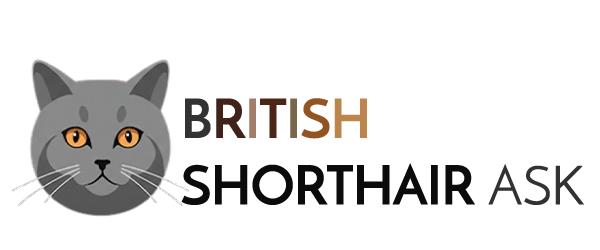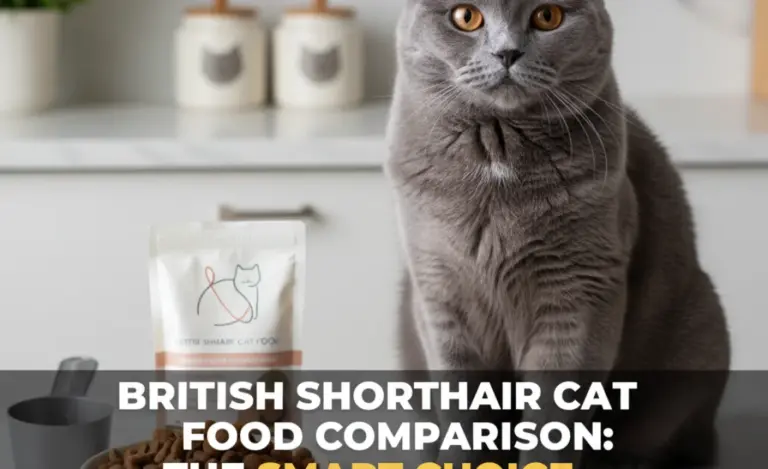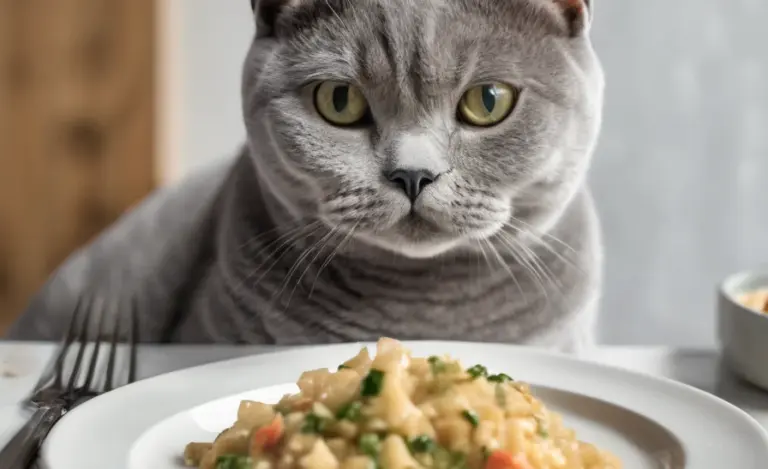British Shorthair Senior Cat Diet Tips: Secret to Health!
British Shorthair senior cats need diets that are easy to digest, lower in calories, and rich in essential nutrients like omega fatty acids and taurine. Choose wet food for hydration, and consider supplements for joint health. Always consult your vet for personalized advice.
As our beloved British Shorthairs gracefully age, their dietary needs change. It’s a natural part of life, but it can be a little worrying for us cat parents. You might notice your senior kitty slowing down, sleeping more, or even becoming a bit picky with their food. Don’t worry; it’s all manageable with the right approach. This guide will walk you through everything you need to know to keep your senior British Shorthair happy and healthy through their golden years. We’ll cover food choices, supplements, feeding schedules, and how to handle those common senior cat challenges. Let’s dive in and ensure your furry friend enjoys a comfortable and nutritious life!
Understanding the Nutritional Needs of Senior British Shorthairs
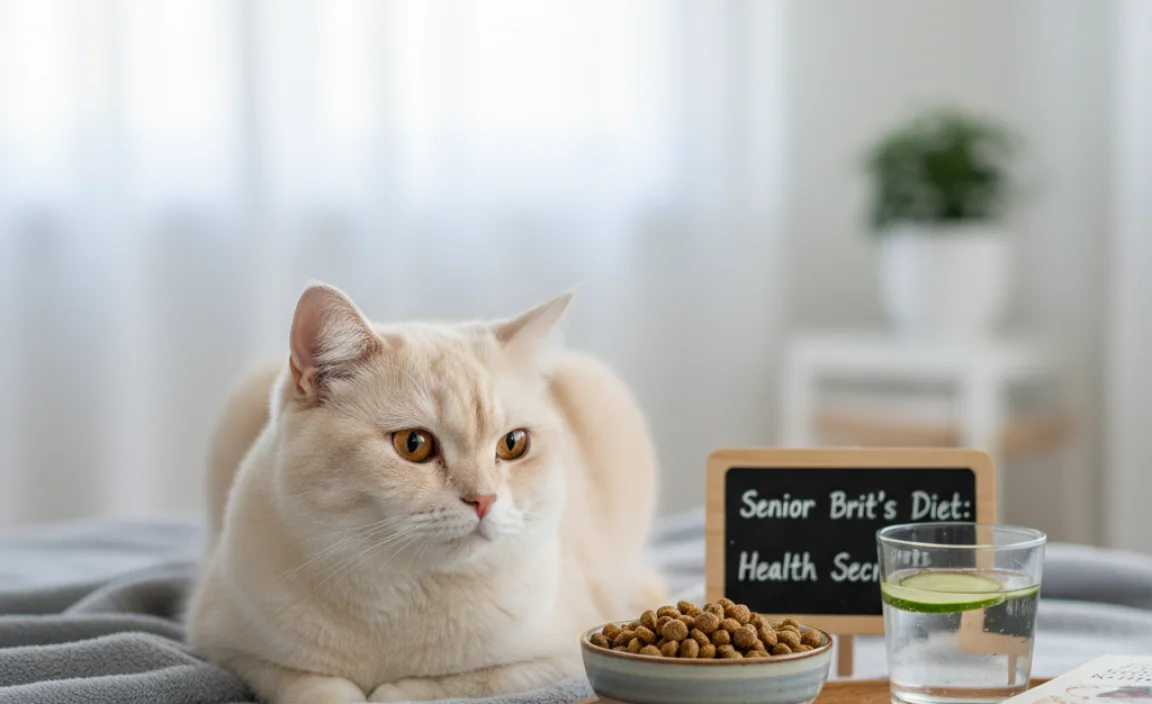
Senior cats, generally those over the age of seven, have different dietary requirements compared to their younger counterparts. Their metabolism slows down, and they may become less active, leading to weight gain if their diet isn’t adjusted. At the same time, some senior cats may experience muscle loss, making protein intake crucial. Understanding these changes is the first step in providing the best care for your aging British Shorthair.
Why Senior Cats Need a Special Diet
Senior cats often have reduced kidney function, decreased digestive efficiency, and dental issues that can impact their ability to eat properly. A specialized diet addresses these age-related changes, supporting overall health and well-being. According to the RSPCA, providing appropriate nutrition is essential for maintaining a senior cat’s quality of life.
Here’s a quick rundown of why a senior cat diet is so important:
- Reduced Kidney Function: Lower protein and phosphorus levels can help ease the strain on their kidneys.
- Decreased Digestive Efficiency: Easily digestible ingredients ensure they absorb the nutrients they need.
- Dental Issues: Softer food textures make it easier for cats with dental problems to eat comfortably.
Key Nutrients for Senior British Shorthairs
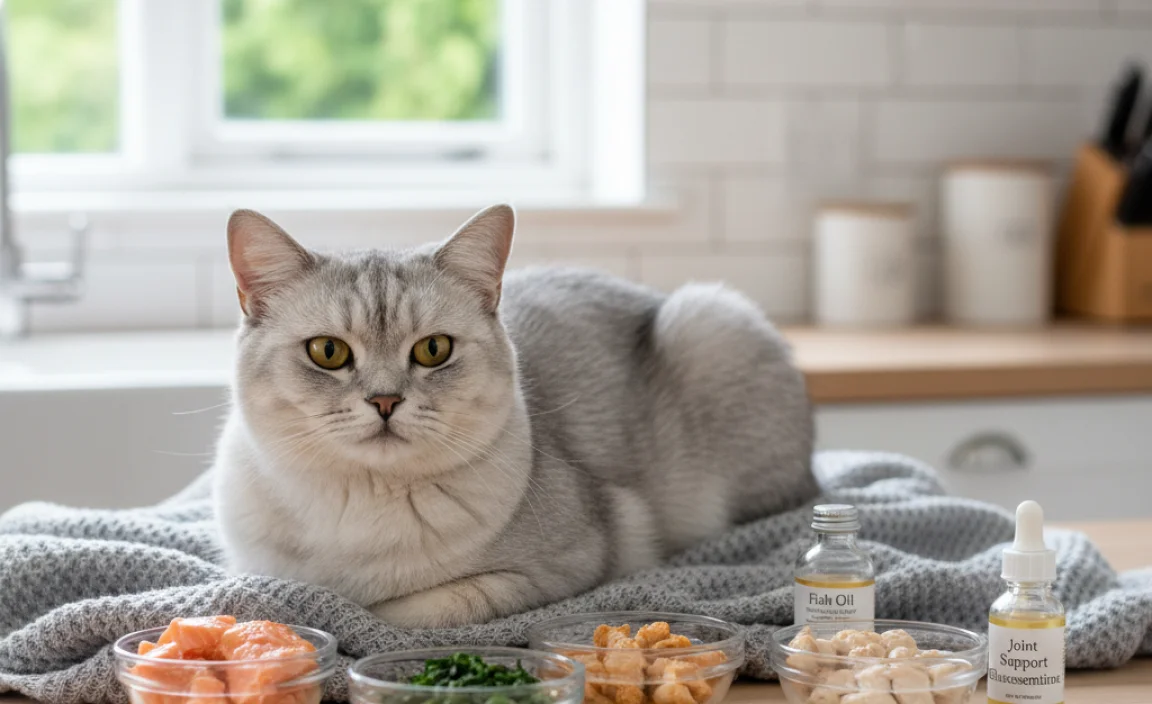
When selecting food for your senior British Shorthair, focus on these essential nutrients:
- High-Quality Protein: Supports muscle mass and overall health. Look for named protein sources like chicken, turkey, or fish.
- Omega-3 Fatty Acids: Helps reduce inflammation and supports joint health. Fish oil is an excellent source.
- Antioxidants: Boosts the immune system and combats age-related cellular damage. Vitamins E and C are great choices.
- Fiber: Aids digestion and prevents constipation, a common issue in senior cats.
- Taurine: Essential for heart health and vision. Cats cannot produce taurine on their own, so it must be included in their diet. According to the Cornell Feline Health Center, taurine deficiency can lead to serious health problems in cats.
Choosing the Right Type of Food
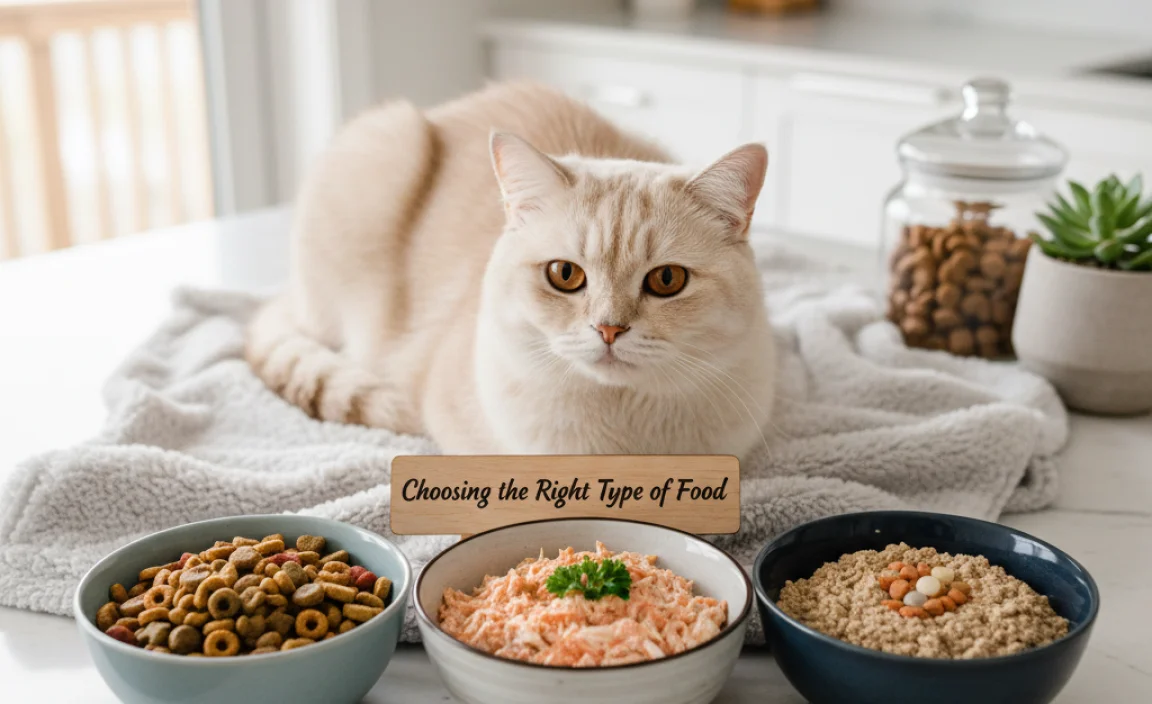
Deciding between wet and dry food, or a combination of both, is an important consideration for senior cat diets. Each type has its own benefits and drawbacks.
Wet Food vs. Dry Food
| Type of Food | Pros | Cons |
|---|---|---|
| Wet Food |
|
|
| Dry Food |
|
|
For senior British Shorthairs, wet food is often the preferred choice due to its higher moisture content, which helps support kidney function and prevents dehydration. It’s also easier on their teeth, especially if they have dental problems. However, dry food can still be part of their diet, especially if it’s formulated for senior cats and offers dental benefits.
Reading Food Labels
Understanding how to read pet food labels is crucial for making informed decisions. Here’s what to look for:
- Ingredient List: The first ingredient should be a named protein source (e.g., chicken, beef, or fish).
- Guaranteed Analysis: Check the percentages of protein, fat, fiber, and moisture. Ensure the protein level is adequate and the fat content is moderate.
- Nutritional Adequacy Statement: Look for a statement that the food meets the nutritional levels established by the Association of American Feed Control Officials (AAFCO) for senior cats.
- Avoid Fillers: Stay away from foods with excessive amounts of fillers like corn, wheat, and soy.
Creating a Senior Cat Feeding Schedule
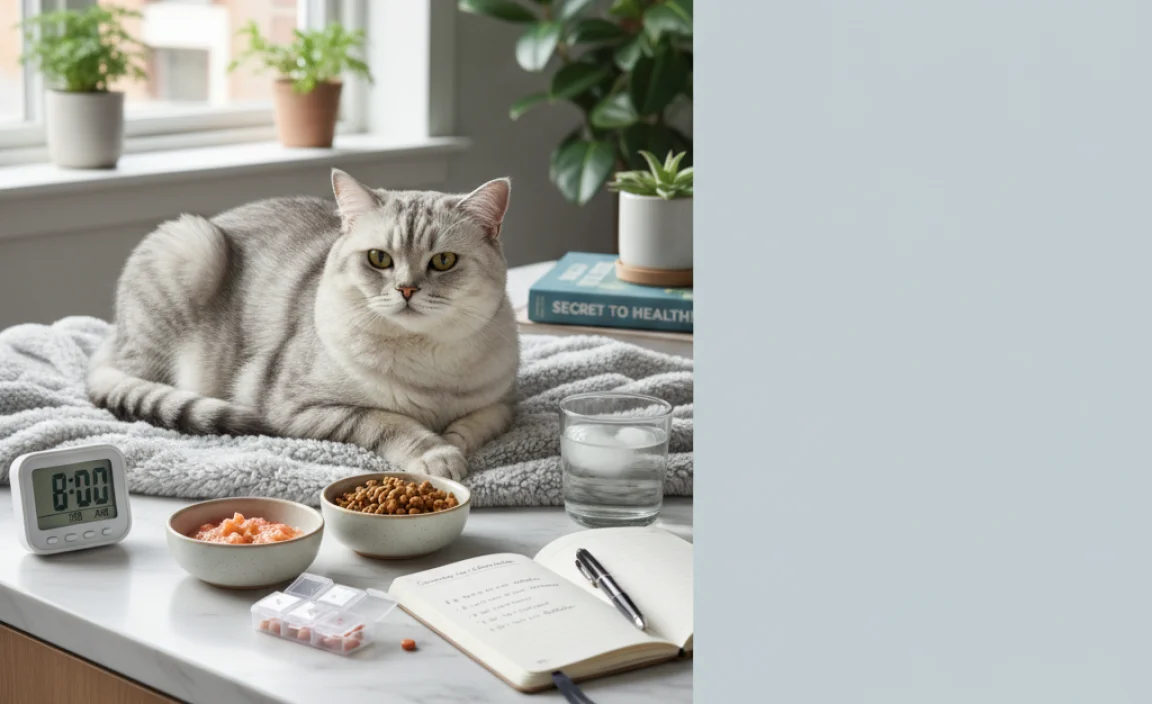
Establishing a consistent feeding schedule is important for senior cats. It helps regulate their digestive system and ensures they get the nutrients they need at regular intervals.
How Often to Feed Your Senior Cat
Most senior cats do well with two meals a day, spaced about 12 hours apart. However, some cats may prefer smaller, more frequent meals. Observe your cat’s eating habits and adjust the schedule accordingly. Always provide fresh water alongside their meals.
Portion Control
Senior cats often require fewer calories due to their reduced activity levels. Overfeeding can lead to weight gain, which can exacerbate joint problems and other health issues. Work with your veterinarian to determine the appropriate portion size for your cat based on their weight, activity level, and overall health.
Here’s a general guideline for portion sizes:
- Small Cat (8-10 lbs): Approximately 1/4 to 1/2 cup of dry food per day, or 3-4 ounces of wet food twice daily.
- Medium Cat (10-12 lbs): Approximately 1/2 to 3/4 cup of dry food per day, or 4-5 ounces of wet food twice daily.
- Large Cat (12+ lbs): Approximately 3/4 to 1 cup of dry food per day, or 5-6 ounces of wet food twice daily.
Remember, these are just guidelines. Always adjust based on your vet’s recommendations and your cat’s individual needs.
Supplements for Senior British Shorthairs
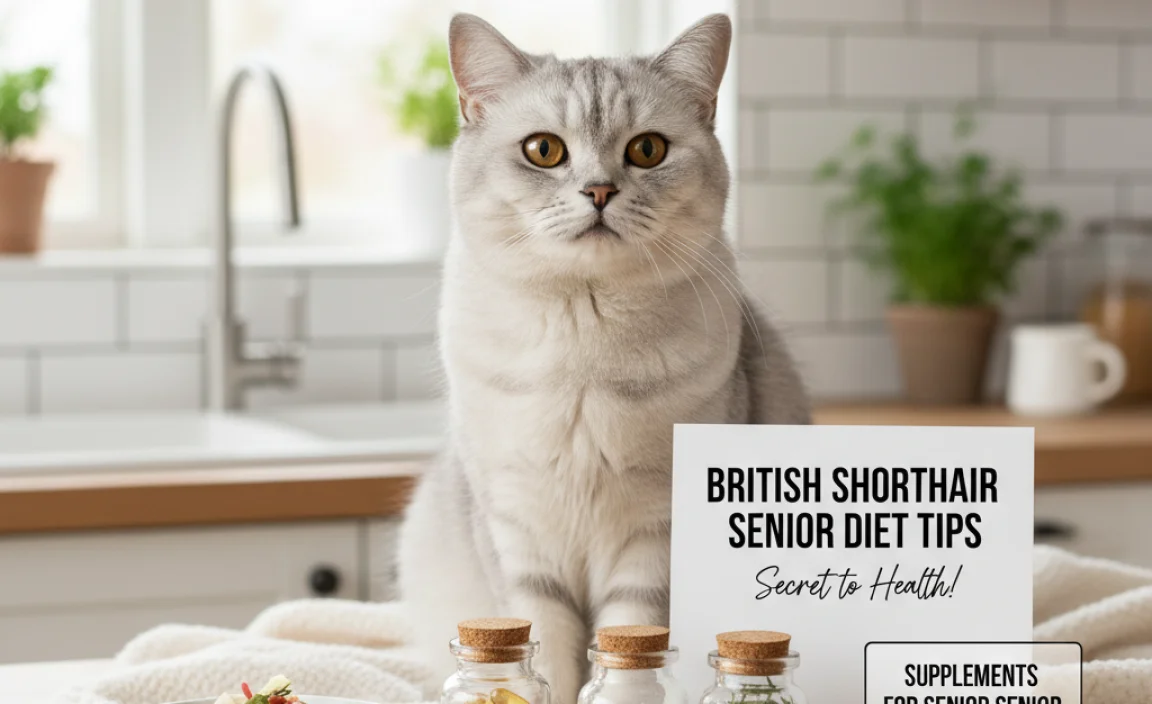
Supplements can play a vital role in supporting the health of senior British Shorthairs. They can help address specific age-related issues and improve overall well-being.
Essential Supplements
- Omega-3 Fatty Acids: Reduces inflammation, supports joint health, and improves coat quality.
- Glucosamine and Chondroitin: Supports joint health and mobility, especially beneficial for cats with arthritis.
- Probiotics: Improves gut health and digestion, helping to prevent digestive issues.
- Antioxidants (Vitamin E, Vitamin C): Boosts the immune system and protects against cellular damage.
How to Administer Supplements
Supplements come in various forms, including capsules, powders, and liquids. The easiest way to administer them is to mix them with your cat’s food. If your cat is a picky eater, you can try hiding the supplement in a small amount of wet food or a treat. Always follow the dosage instructions on the supplement label or as directed by your veterinarian.
Addressing Common Dietary Challenges in Senior Cats
Senior cats can sometimes be finicky eaters or have difficulty eating due to dental issues. Here’s how to handle some common dietary challenges.
Picky Eating
If your senior British Shorthair is turning their nose up at their food, try these tips:
- Warm the Food: Warming the food slightly can enhance its aroma and make it more appealing.
- Offer Variety: Try different flavors or textures of food to see what your cat prefers.
- Use Toppers: Sprinkle a small amount of a tasty topper, like tuna juice or low-sodium chicken broth, on their food.
- Ensure Freshness: Make sure the food is fresh and hasn’t been sitting out for too long.
Dental Issues
Dental problems are common in senior cats and can make eating painful. Here’s how to help:
- Choose Soft Food: Opt for wet food or soften dry food with water.
- Smaller Bites: Offer smaller, more manageable bites.
- Regular Dental Check-ups: Schedule regular dental check-ups with your veterinarian to address any dental issues promptly.
Weight Management
Maintaining a healthy weight is crucial for senior cats. Whether your cat is underweight or overweight, proper diet management is essential.
If Your Cat is Underweight
- Increase Calorie Intake: Offer more frequent meals or choose a food with a higher calorie density.
- Ensure Adequate Protein: Make sure your cat is getting enough protein to maintain muscle mass.
- Rule Out Underlying Health Issues: Consult your veterinarian to rule out any underlying health problems that may be contributing to weight loss.
If Your Cat is Overweight
- Reduce Calorie Intake: Choose a food with lower calorie density and monitor portion sizes carefully.
- Increase Activity: Encourage gentle exercise to help burn calories.
- Avoid Table Scraps: Refrain from giving your cat table scraps or treats, as these can contribute to weight gain.
Transitioning to a Senior Diet
When switching your British Shorthair to a senior diet, it’s important to do so gradually to avoid digestive upset. A slow transition allows your cat’s digestive system to adjust to the new food.
Gradual Transition
Here’s a step-by-step guide to transitioning your cat’s diet:
- Day 1-2: Mix 25% of the new food with 75% of the old food.
- Day 3-4: Mix 50% of the new food with 50% of the old food.
- Day 5-6: Mix 75% of the new food with 25% of the old food.
- Day 7: Feed 100% of the new food.
Monitor your cat’s stool during the transition. If you notice any signs of digestive upset, such as diarrhea or vomiting, slow down the transition or consult your veterinarian.
Monitoring Your Senior Cat’s Health
Regular veterinary check-ups are essential for senior cats. Early detection of health issues can significantly improve their quality of life.
Regular Vet Visits
Senior cats should have a veterinary check-up at least twice a year. These visits allow your veterinarian to monitor their overall health, screen for age-related diseases, and make any necessary adjustments to their diet or treatment plan.
Signs to Watch For
Be vigilant about monitoring your cat for any signs of illness or discomfort. Common signs of health issues in senior cats include:
- Changes in appetite or water consumption
- Weight loss or gain
- Lethargy or decreased activity
- Changes in litter box habits
- Vomiting or diarrhea
- Difficulty chewing or swallowing
- Increased vocalization
If you notice any of these signs, consult your veterinarian promptly. According to International Cat Care, early intervention is key to managing health issues in senior cats.
Frequently Asked Questions
Here are some common questions about feeding senior British Shorthairs:
What is the best food for a senior British Shorthair?
The best food is high in protein, moderate in fat, and low in fillers. Look for a food specifically formulated for senior cats with named protein sources like chicken or fish. Wet food is often preferred due to its higher moisture content.
How much should I feed my senior British Shorthair?
Portion sizes depend on your cat’s weight, activity level, and overall health. Generally, a small cat (8-10 lbs) needs about 1/4 to 1/2 cup of dry food per day, or 3-4 ounces of wet food twice daily. Always consult your vet for personalized recommendations.
Are supplements necessary for senior cats?
Supplements can be beneficial, especially for joint health, digestion, and immune support. Omega-3 fatty acids, glucosamine, chondroitin, and probiotics are common choices. Talk to your vet before starting any new supplements.
How can I help my senior cat with dental issues eat better?
Choose soft food, either wet food or dry food softened with water. Offer smaller bites and schedule regular dental check-ups with your veterinarian to address any dental problems promptly.
What should I do if my senior cat is a picky eater?
Try warming the food slightly to enhance its aroma, offer a variety of flavors and textures, and use toppers like tuna juice or low-sodium chicken broth. Ensure the food is fresh and hasn’t been sitting out for too long.
How often should I take my senior cat to the vet?
Senior cats should have a veterinary check-up at least twice a year. Regular visits allow your vet to monitor their overall health, screen for age-related diseases, and make necessary adjustments to their care plan.
How do I transition my cat to a senior diet?
Transition gradually over 7-10 days. Start by mixing 25% of the new food with 75% of the old food, gradually increasing the proportion of new food each day. Monitor your cat’s stool for any signs of digestive upset.
Conclusion
Caring for a senior British Shorthair involves understanding and adapting to their changing nutritional needs. By choosing the right food, establishing a consistent feeding schedule, and considering supplements, you can help your furry friend thrive in their golden years. Remember, regular veterinary check-ups and close monitoring of their health are essential for ensuring a happy, comfortable, and fulfilling life. With a little extra care and attention, your senior British Shorthair can continue to bring joy and companionship for many years to come. After all, they are family, and their well-being is worth every effort!
